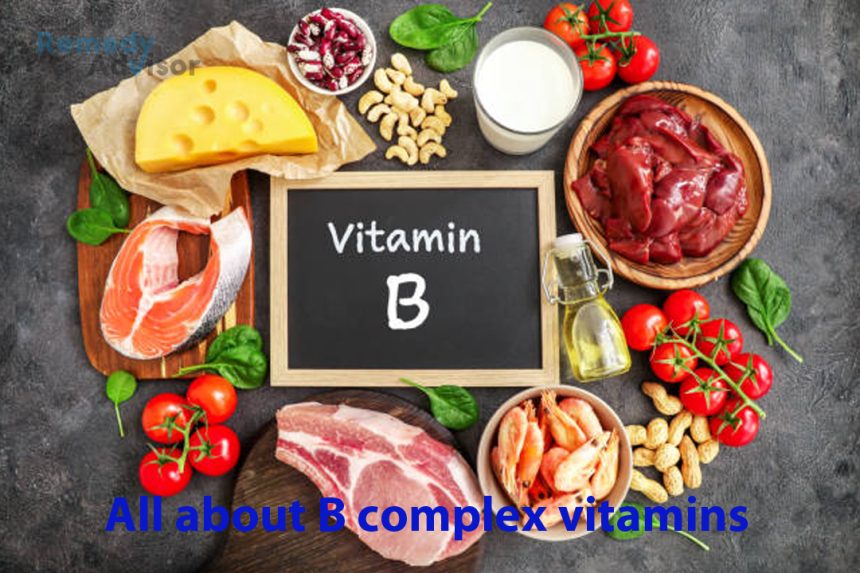Thiamine and riboflavin? Are they that new juggling act from the Ukraine?
No. They are part of the B complex vitamins, perhaps one of the greatest teams of all time.
The team spirit
Whatt a team! Separately, each B vitamin’s function is important, but taken together, as a team, they become even more potent. B vitamins are essential for good blood circulation and helping the heart stay healthy. They also keep the correct hormone balance in your body, and they play an important role in keeping your immune system strong. And they help keep you mentally alert and emotionally stable, improve your energy and help you deal with stress.
How can you be sure you’ll get the right amount of B vitamins in your diet?
“Relax,” says Jack M. Cooperman, Ph.D., director of nutrition at New York Medical College. “If you eat a balanced diet every day, your body will be receiving all the B vitamins it needs to keep it in perfect running order. The beauty of Mother Nature is that everything our bodies need for good health is given to us in our foods. Eat balanced meals every day and you will be getting all your B vitamins.”
Playing by the rules
Your body will let you know if it isn’t receiving enough B vitamins in your daily diet. If you can’t shake off a cold or you’re always getting infections, if you’re having trouble sleeping, concentrating or keeping up your appetite, if you feel sleepy after meals, have low energy or frequent constipation, chances are your daily diet is lacking in the B complex.
Individually, each vitamin has an important position in the B-team. According to Dr. Cooperman, here’s what they do.
Thiamine (B1)
Why is thiamine an important part of the vitamin B-team? It promotes growth, aids in digestion, improves mental attitude and keeps your nervous system, muscles and heart in good running order.
Good sources of thiamine are whole grain cereals, pork products, brewer’s yeast, green peas and other legumes, beef kidney, beef liver and sunflower seeds.
Riboflavin (B2)
When riboflavin enters the body as part of the B-team, it promotes healthy skin, nails and hair, stops eye fatigue and is essential for converting protein, fats and carbohydrates into energy.
Good sources of riboflavin are milk, beef and chicken liver, beef kidney, brewer’s yeast, Swiss cheese and enriched flour and bread.
Niacin
Niacin is crucial for the proper maintenance of healthy skin. It works in tandem with riboflavin to convert carbohydrates, fats and protein into useful energy. A deficiency may even cause dementia. Good sources of niacin are liver, lean meats, poultry, peanut butter, beef kidney, legumes and salmon.
B6 (pyridoxine)
This member of the B-team helps prevent skin and nervous disorders and guards against infections. It helps slow down aging and prevents restless sleep. It can even work as a natural diuretic.
Such foods as whole grain cereals, liver, beef kidney, white meats (chicken and fish), potatoes, avocados, bananas, egg yolks and sunflower seeds contain an abundance of B6.
B12 (cyanocobalamin)
If there were no Bj2, there would be unhealthy nervous systems, bad mental concentration, memory and balance, no red blood cells, irritability galore and a planet full of insomniacs.
But don’t fret! There’s plenty of Bi2 around but only in animal products. It can be found in meats, liver, kidney, milk, Swiss cheese, salmon and eggs.
Foliate
Foliate, or folic acid, is needed by your body to produce the genetic factors RNA and DNA, thereby making it essential for the manufacture and repair of all cells. It also prevents anemia and infections and aids in the development of the immune system.
Good sources of foliate are wheat germ, beef and chicken liver, beef kidney, brewer’s yeast, mushrooms, oranges and orange juice, asparagus, broccoli, lima beans, bananas, strawberries, sunflower seeds, cantaloupe and some legumes.
Pantothenate
Pantothenate, or pantothenic acid, is necessary to build complex molecules like fats and hemoglobin. Without it, the body’s ability to carry out certain chemical functions would be diminished.
The term pantothenate is derived from the Greek word panthos, meaning “everywhere.” Although pantothenate is found in many foods, certain processing methods, such as flour milling, destroy it. It is found in particularly high amounts in organ meats, whole grain cereals and most fish.
Do you need supplements?
Unless you are under a doctor’s care and eating less than 1,200 calories a day or not eating a balanced diet, you needn’t worry about getting enough B vitamins, says Dr. Cooperman. “But remember,” He says, “the body cannot store the B complex, making it essential that you eat a balanced diet every day.”
So speak with your doctor. If you aren’t eating a balanced diet, he may prescribe a multivitamin supplement.







